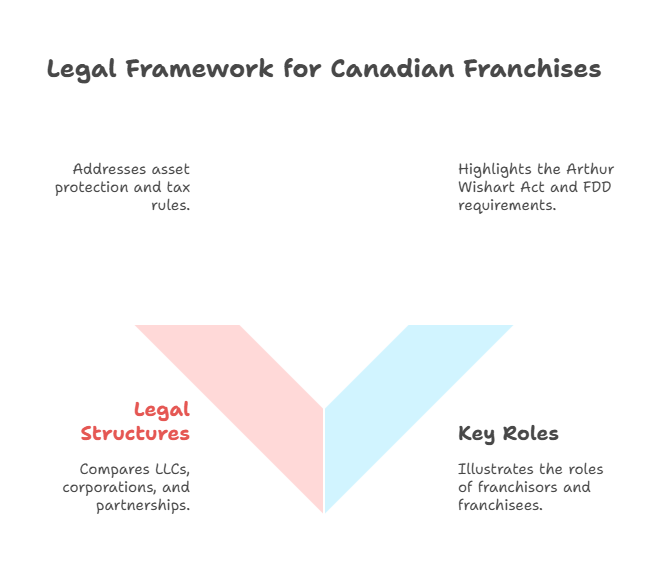Starting a franchise in Canada lets you build a business with a proven brand. You must choose a legal structure that fits your goals. The Canadian Franchise Association says over 76,000 franchises add $100 billion to Canada’s economy yearly. Your structure affects liability, taxes, and growth. It must follow laws like Ontario’s Arthur Wishart Act (Franchise Disclosure), 2000.
This article covers Limited Liability Companies (LLCs), corporations, and partnerships, giving clear insights for franchisees and franchisors in Canada. This guide will help you understand:
- Main legal structures and their benefits for franchises.
- How liability, taxes, and scalability shape your decision.
- Canadian laws, like the Arthur Wishart Act, impact franchises.
- Factors for single-unit and multi-unit franchise setups.
- Steps to pick a structure that supports your goals.
The Legal Blueprint for Canadian Franchise Businesses
Franchising in Canada follows specific laws. These laws shape how you organize and run your business. A franchisor builds a brand, while a franchisee opens a location. Your legal structure impacts asset protection, taxes, and compliance. Ontario’s Arthur Wishart Act requires franchisors to provide detailed Franchise Disclosure Documents (FDDs). For a Toronto franchisee, your structure must protect personal assets from risks like lawsuits. Franchisors need structures that secure intellectual property and aid growth.
Key roles in franchising include:
- Franchisor: Grants rights to use its brand, like Tim Hortons or Subway, and collects royalties.
- Franchisee: Runs a local franchise, managing operations and compliance.
The franchise business structure options you choose affect liability, taxes, and scalability. LLCs, corporations, and partnerships each have distinct features. Canada Revenue Agency (CRA) tax rules and Ontario’s registration laws add considerations.

Comparing Legal Structures for Franchises
Your legal structure sets the stage for your franchise’s success. We analyze three options: LLC, corporation, and partnership. Each is reviewed for liability, taxation, setup, and fit for Canadian franchises. Examples show how they work in practice.
Limited Liability Company (LLC)
An LLC is popular for Canadian franchisees, especially for single-unit operations. The LLC for franchise business separates personal and business assets. If a customer sues your Toronto franchise, your savings stay safe. LLCs use pass-through taxation, so profits go on your personal tax return. This simplifies CRA filings, like T1 returns. Setup is easy: register with Ontario’s Ministry of Government and Consumer Services.
Benefits include:
- Limited liability protects personal assets.
- Pass-through taxation avoids corporate taxes.
- Simple setup reduces legal costs.
Drawbacks are:
- No share issuance, limiting investor options.
- Multiple LLCs for multi-unit franchises add complexity.
A Mississauga café franchisee might choose an LLC for simplicity. It could save thousands in legal fees compared to a corporation.
Corporation
A corporation is a separate legal entity, ideal for franchisors or multi-unit franchisees. The corporation for franchise ownership shields personal assets from risks, like a lawsuit at a franchise location. Corporations can issue shares, raising capital for growth. This suits franchisors scaling across Canada or franchisees opening multiple Toronto locations. They follow the Canada Business Corporations Act or Ontario’s Business Corporations Act.
Advantages include:
- Strong liability protection for personal assets.
- Share issuance supports expansion.
- Scalability for multi-unit franchises.
Limitations are:
- Higher setup costs, like articles of incorporation.
- Complex tax filings with double taxation (13.5% corporate rate in Ontario, plus personal taxes).
Small business deductions help for profits under $500,000. A franchisee with three locations might use a corporation for growth but face more paperwork.
Partnership
Partnerships involve two or more people sharing ownership. They are rare in franchising due to risks. Setup is simple, with minimal formalities. Profits pass through to personal tax returns, like LLCs, simplifying CRA filings. General partnerships have unlimited liability, risking personal assets if the business faces debts or lawsuits. Limited partnerships are uncommon, as franchisors prefer LLCs or corporations.
Pros include:
- Easy setup with low costs.
- Pass-through taxation simplifies filings.
Cons include:
- Unlimited liability risks personal assets.
- Less common due to franchisor preferences.
Two friends opening a tutoring franchise might use a partnership. The legal requirements for franchising, like the Arthur Wishart Act, require legal review for partnerships.
Factors to Consider for Franchise Structures
Choosing a franchise structure means evaluating key factors. These factors ensure your choice fits your business and Canadian laws. We cover liability protection, tax implications, scalability, compliance, franchisor requirements, and operational flexibility with examples.
Liability Protection
Liability protection keeps personal assets safe. LLCs and corporations limit liability. A $50,000 lawsuit against your Toronto franchise won’t touch your home or savings. Partnerships and sole proprietorships risk personal finances. For example:
- A pizza franchise faces a slip-and-fall lawsuit.
- An LLC or corporation protects your personal assets.
- A partnership leaves your savings at risk.
Franchises deal with customers, increasing legal risks. Choose a structure with strong protection.
Tax Implications
Taxes vary by structure. LLCs and partnerships use pass-through taxation. Profits go on your personal tax return, avoiding corporate taxes. A franchisee earning $100,000 files a T1 return. Corporations face double taxation:
- Corporate income tax (13.5% in Ontario for small businesses).
- Personal tax on dividends.
- Small business deductions apply for profits under $500,000.
Service-based franchises with over $30,000 in revenue must register for Harmonized Sales Tax (HST). A tax professional clarifies CRA rules.
Scalability
Growth plans shape your structure. Corporations suit multi-unit franchises or franchisors. They allow share issuance for capital. Canadian Tire uses a corporate structure for hundreds of locations. LLCs work for single-unit franchisees but need separate registrations for multiple locations. Partnerships are not scalable due to:
- Shared liability risks.
- Complex decision-making.
A franchisee planning five locations might choose a corporation.
Compliance
Franchises follow Canadian laws. Ontario’s Arthur Wishart Act requires an FDD with costs, obligations, and risks. Franchisees register in the province of operation, like Ontario for Toronto. They need:
- Permits and licenses (e.g., Toronto business license).
- A CRA Employer Identification Number (EIN).
- Health permits for food franchises.
Non-compliance risks fines or contract disputes. A Toronto restaurant franchise must meet city health rules.
Franchisor Requirements
Franchisors set structure preferences in the FDD. McDonald’s may require LLCs or corporations for legal separation. For example:
- Subway’s FDD might mandate an LLC.
- This protects the brand and ensures compliance.
Reviewing the FDD ensures your structure aligns with franchisor rules.
Operational Flexibility
LLCs have simple management with few formalities. Corporations need directors, shareholders, and annual meetings. Partnerships are flexible but risky due to unlimited liability. Consider:
- LLCs for single-unit simplicity.
- Corporations for multi-unit structure.
A franchise lawyer Toronto can guide you through these factors for a tailored structure.
Structuring Multi-Unit Franchises
Multi-unit franchising is popular in Canada, especially in Toronto. The International Franchise Association notes multi-unit operators control over 50% of U.S. franchise units, a trend seen in Canada. Structuring these franchises requires planning for liability, compliance, and efficiency.
Franchisors often require each location to be a separate LLC. A franchisee with three Subway locations in Toronto sets up three LLCs, each with a Doing Business As (DBA) name, like “Subway Store #1234.” This limits liability:
- A lawsuit against one location won’t affect others.
- Personal assets stay protected.
A parent corporation can manage multiple LLCs, streamlining operations. This needs separate CRA registrations and permits per location.
Compliance includes:
- An FDD for each unit, per Ontario’s Arthur Wishart Act.
- Local permits, like health inspections for food franchises.
- Toronto zoning laws for each outlet.
Non-compliance risks fines or operational halts. A Toronto food franchise needs city licenses for each location.
Taxes are complex. Each LLC files its own return. A parent corporation consolidates reporting but may face:
- Payroll taxes for employees at each location.
- Separate EINs for three Toronto locations with 50 employees.
Operationally, multiple LLCs need systems for:
- Accounting and payroll.
- Staffing and compliance.
A parent corporation simplifies these but raises setup costs. The FDD outlines franchisor rules, like separate entities per unit. Legal advice ensures compliance and supports growth.
Your Franchise Business, Perfected by Us ,Discover Why
We’ve helped more than 80 franchise locations across Canada set up their legal structures the right way from the start. Whether you’re buying your first unit or scaling to a multi-unit enterprise, the legal groundwork matters.
At Cloudhaus Law, we provide:
- Flat-fee pricing, so there are no billing surprises
- Legal support from a dual-licensed lawyer (Canada/U.S.)
- Experience across industries including retail, food service, and service-based franchises
- Virtual consultations tailored for Ontario and national clients
One client who opened a franchise in Mississauga started with one location. We helped them incorporate, meet franchisor requirements, and later restructure to support two additional units. Their expansion was seamless because their legal base was sound from day one.
FAQs on Franchise Legal Structures
Is an LLC or corporation better for owning a franchise?
An LLC suits single-unit franchisees with simple taxation. Corporations fit multi-unit franchises or franchisors for scalability. Legal advice picks the right one.
Can I run a franchise as a sole proprietor?
Sole proprietorships risk personal assets due to unlimited liability. Franchisors prefer LLCs or corporations. A lawyer checks if it fits your franchise.
What are the tax benefits of forming an LLC for a franchise?
LLCs use pass-through taxation, avoiding corporate taxes. Profits go on personal returns, simplifying CRA filings. A tax professional explains CRA rules.
Do franchisors require a specific legal structure?
Franchisors often mandate LLCs or corporations for compliance. The FDD lists requirements. Legal guidance ensures your structure fits.
How does the legal structure affect franchise liability?
LLCs and corporations protect personal assets from lawsuits. Partnerships and sole proprietorships risk personal finances. Choose a safe structure.
Can I change my franchise’s legal structure later?
Changing structures, like LLC to corporation, involves tax and legal steps. A lawyer ensures compliance with CRA filings.
Which legal structure is most common for new franchise owners?
LLCs are common for new franchisees. They offer simplicity and protection. A lawyer confirms the best choice.
Final Thoughts: The Right Structure Builds a Stronger Franchise
Choosing the right legal structure is not just a formality. It shapes how you manage liability, handle taxes, raise capital, and scale your franchise. Whether you’re launching a single unit or building a multi-location enterprise, the foundation must support your long-term goals and meet the expectations of both Canadian law and your franchisor.
Understanding the pros and cons of LLCs, corporations, and partnerships helps you avoid costly mistakes and operate with confidence. Laws like Ontario’s Arthur Wishart Act are designed to protect you, but the right legal guidance brings those protections to life.
At Cloudhaus Law, we help franchisees and franchisors across Canada choose structures that make business sense and legal sense. We turn complexity into clarity, so your franchise is built to last.
Ready to structure your franchise with confidence? Book your free consultation at cloudhauslaw.com or call (647) 965-0516 today.






